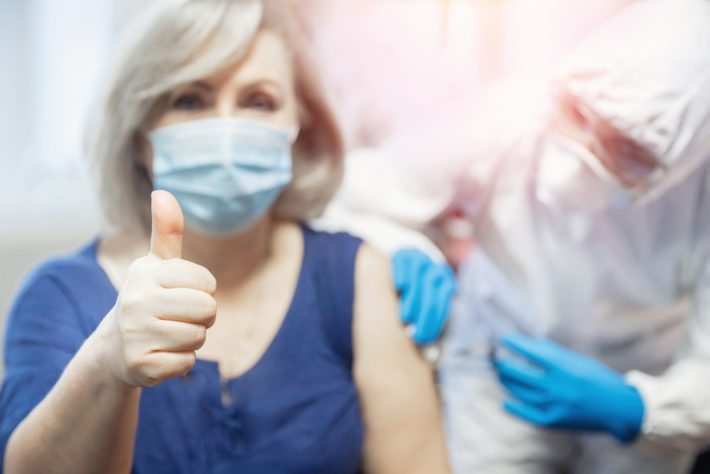
With all the talk about vaccinations to stop the current pandemic, a lot of people are forgetting that there are some very important other vaccines… and they are the ones that help keep them well for a number of serious illnesses.
The Advisory Committee on Immunization Practices in the United States and the National Advisory Committee on Immunizations in Canada set the national standards for Immunizations. These are guidelines for some adult immunizations in women. It is provided by the North American Menopause Society (NAMS).
Hepatitis A and B: Both of these liver diseases are serious and can lead to death, so prevention is a really good idea. Chronic hepatitis or inflammation of the liver, increases the risk of cirrhosis and hepatoma, a cancer of the cells of the liver.
The hepatitis A vaccine is recommended for everyone, particularly if you have risk factors like using illicit drugs, have a chronic liver disease, or travel to countries with medium to high rates of hepatitis A. Unless you are an at-risk person, or are traveling to a place that will put you at increased risk, once you have the hepatitis A vaccination, it will stick around for a long time and you don’t need another one.
Hepatitis B has been recommended for all infants and children since the 1990s in the US and Canada.
Human papillomavirus vaccine (HPV): HPV is a virus that is sexually transmitted. There are several strains of it, and not all are dangerous. But they can cause penile cancer in men and cancer of the cervix, vulvar and the vagina in women.
I will always remember an older woman that I treated for cervical cancer early in my career. In the course of our visit, I asked her if she was still sexually active and if she had any pain with sex.
She explained that she wasn’t sexually active; her partner left her when she got cervical cancer because “he didn’t want to catch it from her.”
The irony of it was, she probably caught cancer from him. It’s likely he had HPV types 16 and 18 that cause 70% of cervical cancer, or one of the other 5 strains that are able to lead to cancer in another 15%, and unknowingly gave her the cancer. Given she hadn’t had other partners, it is highly likely she “caught it” from him by getting the virus that eventually turned into her cancer.
Today there are vaccines that can almost entirely prevent cervical cancer, and anal cancer. Vaccines are also available to prevent genital warts. Vaccination is now recommended for HPV for women and men up to age 26, including men who have sex with men who are older than age 26. These vaccinations are not licensed for men and women in the US over age 45.
It’s important to realize that certain strains of HPV also cause genital warts. If your partner has one of these viruses and you have oral sex, you can also get cancer of the mouth and throat, head, and neck. An HPV vaccination can go a long way to preventing all of that misery.
Influenza vaccine: With all the talk about the pandemic, don’t forget about your flu shot; you still need it, particularly if you are a healthcare worker, immune compromised, or have a chronic medical condition. In a perfect world, it’s best to be vaccinated by the end of October to be ready for flu season, but if you can’t by then, you can still protect yourself by getting one as late as March. Recombinant flu vaccine doesn’t contain any egg so don’t worry about egg allergy. If you’re over 65, there is a higher dose option that is four times stronger, and it lowers your chances of being hospitalized with the flu.
Pneumococcal vaccine: Just like it sounds, this virus causes pneumonia in about half a million people each year in the United States. If you are over 65, and specifically if you are immune compromised, you may be offered the PPV23 version of this vaccine. If you are not immune compromised or have other health considerations, and you are over 50, there is a PCV13 version of the vaccine, and healthy 65+ individuals may be offered this one as well.
Herpes zoster vaccines: This one typically won’t kill you, but it can be murder because of the pain. It also goes by the name of shingles and risk of getting it goes up with age. Pain can continue after the herpes zoster infection goes away, and that can make life a chore. One of my patients got shingles on her vulva and it changed the entire quality of her life. A newer vaccine came to market in 2017 called RZV or Shingrix. If you are over 50, start looking into getting this one. It’s about 97% effective.
Tetanus and Tdap vaccines: If you never got Tdap in the past, get it the next time. It helps to prevent tetanus, diphtheria and pertussis vaccine. A booster is recommended every 10 years. If you are going to be in contact with children younger than one year, (talking to the grandparents now), and you haven’t had Tdap, go and get one so your grandchild won’t get pertussis.
In all instances, discuss your choices with your doctor. But keep in mind what old Ben Franklin said, “An ounce of prevention is worth a pound of cure.”
To read the full recommendations, visit http://www.menopause.org/docs/default-source/professional/practice-pearl-brown-immunizations.pdf
